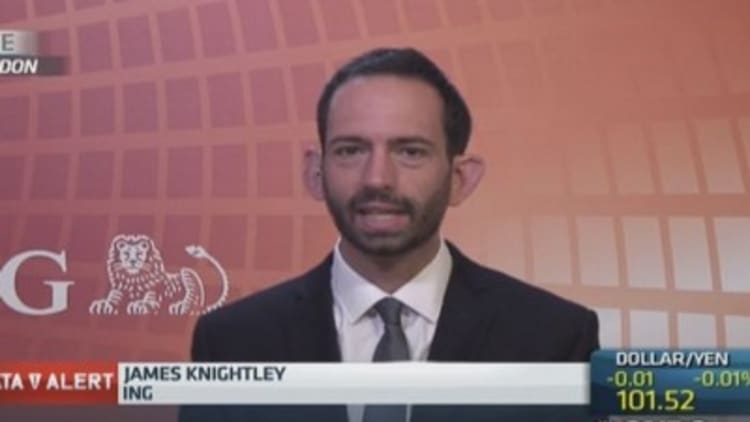As inflation rises quicker than expected in the U.K., fears are rising about how a crippling cost of living and persistently low wages are blighting the country's young people.
UK inflation rose much faster than expected in June, with consumer prices expanding by 1.6 percent year-on-year. It comes as a new research looking at household incomes revealed that young people had been especially hard hit by the financial crisis.
Read MoreUK inflation beats forecasts as food costs rise
The rising cost of clothing, food and non-alcoholic drinks helped drive inflation higher, which Howard Archer, chief U.K. economist at IHS Global Insight, said was "disappointing news" for consumers.
"The rise back up in inflation squeezes consumers' purchasing power, especially as earnings growth currently remains muted and relapsed in April," he said in a note.
Low wage growth has plagued Britain's economic recovery, failing to pick up despite firm signs elsewhere of a strengthening economy.
Average weekly pay (including bonuses) in the three months to April expanded by just 0.7 percent year-on-year. This was below expectations and down from 1.9 percent in the three months to March.
Read MoreUK execs earn '180 times' the average
"It is becoming harder for people to get by as average wages continue to fall behind the rising cost of living. Ministers may have moved on from Britain's living standards crisis but it's still the top concern for families," Frances O'Grady, general secretary of the TUC union, said in a statement. "An economic recovery based on shrinking pay packets is not one built to last."
Young people 'acutely affected'
Young Britons have been hit hard by the rise in living costs, with a report by the Institute for Fiscal Studies (IFS) finding that "the recession and its aftermath have been much harder on the young than the old."
Between 2007-2008 and 2012-2013, real (inflation-adjusted) median household income among 22-30 year olds fell by 13 percent. In comparison, income fell 7 percent among 31-59 year olds, and remained stable for those aged 60 and over.
This slide in real wages was driven, firstly, by a fall of 4 percentage points in employment of those in their 20s, the IFS said. The employment level remained unchanged among 31-59 year olds. Secondly, young peoples' real median pay fell by 15 percent, while for people between the ages of 31-50, pay fell just 6 percent.

The IFS said that the main difference between the current economic tough times and other past recessions is "the remarkable stability of employment for all age groups other than young adults and the very sharp falls in the real pay of workers, by which young adults have been the most acutely affected by some distance."
And the cost of living looks set to rise further, according to economists including ING's James Knightley.
"We're looking at some flat-lining to a gradual move higher (in inflation)," he told CNBC, highlighting that wage growth remained "very, very low."
Payday loans capped
One result of the squeeze on households since the start of the financial crisis has been a growth in the popularity of payday loans. In 2013, 1.6 million U.K. customers took out over 10 million loans with a total value of £2.5 billion, according to the Financial Conduct Authority (FCA).
Read MoreUK payday lender issued 'fake' legal threats: Watchdog
The loans are designed to meet the need for emergency cash, with the average loan per customer just £260, but the lenders have been heavily criticised for their onerous interest rates.
On Tuesday, however, the Financial Conduct Authority said it would clamp down on payday lenders from January 2015.
The watchdog said it would introduce a price cap on payday loans, meaning that consumers will never need to pay back more than twice what they have borrowed and will not pay more than £24 per £100 borrowed.
Consumer group Which? said it was good to see the regulator tackling the "eye-watering cost" of short-term loans.
"Payday lenders have been running wild for too long and the FCA must keep them on a tight leash to protect consumers," Richard Lloyd, the group's executive director, said in a statement.
—By CNBC's Katrina Bishop


